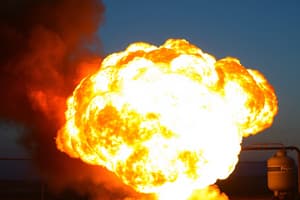Podcast
Questions and Answers
What is diffusion?
What is diffusion?
The overall movement of suspended or dissolved particles resulting from the random movements of individual particles.
What is a fluid?
What is a fluid?
Any material that flows and offers little resistance to change in shape when under pressure.
What is fractional distillation?
What is fractional distillation?
The separation of solution components (fractions) based on boiling points.
What is a liquid?
What is a liquid?
What is a liquid crystal?
What is a liquid crystal?
What does miscible mean?
What does miscible mean?
What is thermal expansion?
What is thermal expansion?
What are van der Waals forces?
What are van der Waals forces?
What is viscosity?
What is viscosity?
Which of the following pure elements exist as liquids at normal Earth temperatures?
Which of the following pure elements exist as liquids at normal Earth temperatures?
Which of the following is not a fluid?
Which of the following is not a fluid?
Which of the following are interactions between particles in a liquid?
Which of the following are interactions between particles in a liquid?
In most materials, as heat energy is absorbed, density _____
In most materials, as heat energy is absorbed, density _____
Which of the following would have the highest viscosity?
Which of the following would have the highest viscosity?
As the ability to flow decreases, viscosity _____
As the ability to flow decreases, viscosity _____
Why is it dangerous to not have the right grade motor oil for the climate you drive in?
Why is it dangerous to not have the right grade motor oil for the climate you drive in?
Which of the following would correctly be termed miscible?
Which of the following would correctly be termed miscible?
Why do gases diffuse faster than liquids?
Why do gases diffuse faster than liquids?
A common method used to separate liquid solutions is _____.
A common method used to separate liquid solutions is _____.
Which liquids are highly sensitive to both changes in temperature and changes in the electrical field?
Which liquids are highly sensitive to both changes in temperature and changes in the electrical field?
What is fluid pressure?
What is fluid pressure?
What is force?
What is force?
What is a hydraulic lift?
What is a hydraulic lift?
What is weight?
What is weight?
What is the metric unit of force?
What is the metric unit of force?
What causes the weight of an object to change depending on if it is on Earth or the Moon?
What causes the weight of an object to change depending on if it is on Earth or the Moon?
What is the weight of a mouse at sea level on Earth if the mass is around 22 grams (0.022 kg)?
What is the weight of a mouse at sea level on Earth if the mass is around 22 grams (0.022 kg)?
What is adhesion?
What is adhesion?
What is capillary action?
What is capillary action?
What is cohesion?
What is cohesion?
What is evaporation?
What is evaporation?
What is surface tension?
What is surface tension?
Flashcards are hidden until you start studying
Study Notes
Characteristics of Liquids
-
Diffusion: Refers to the random movement of particles leading to the overall distribution of suspended or dissolved substances.
-
Fluid: Describes materials that can flow and undergo minimal resistance to shape change when subjected to pressure.
-
Fractional Distillation: Method used for separating components of a solution based on their boiling points.
-
Liquid: State of matter that maintains a constant volume while assuming the shape of its container.
-
Liquid Crystal: Unique materials exhibiting properties of both solids and liquids, responsive to temperature and electrical fields.
-
Miscible: The capability of certain liquids to dissolve in one another completely.
-
Thermal Expansion: A phenomenon where a substance's volume changes based on temperature variations.
-
Van der Waals Forces: Weak attractions that occur between the polar regions of neighboring molecules.
-
Viscosity: A measure indicating a liquid's resistance to flow; higher viscosity means slower flow.
-
Liquid Elements: At normal Earth temperatures, bromine and mercury exist in liquid form.
-
Non-fluid Material: Aluminum is classified as a solid and does not flow under normal circumstances.
-
Liquid Interactions: Key interactions in liquids include van der Waals forces and hydrogen bonds.
-
Density and Heat: For most materials, increased heat absorption leads to a decrease in density.
-
Highest Viscosity: Honey is an example of a liquid with significantly high viscosity compared to others.
-
Viscosity Relationship: A decrease in flow ability of a liquid correlates with an increase in its viscosity.
-
Motor Oil and Temperature: The viscosity of motor oil changes with temperature, affecting engine performance. Low temperatures increase viscosity, while high temperatures decrease it.
-
Miscibility Example: Alcohol readily mixes with water, demonstrating miscible behavior.
-
Gas Diffusion: Gas particles diffuse at a faster rate than liquids because they possess higher kinetic energy.
-
Common Separation Method: Fractional distillation is frequently used to separate various liquid solutions.
-
Sensitivity of Liquid Crystals: Liquid crystals are notably sensitive to temperature and electrical field changes.
-
Fluid Pressure: Fluids exert pressure on the surfaces of objects they come in contact with.
-
Force Definition: Force alters the motion or direction of an object with mass.
-
Hydraulic Lift: Equipment consisting of two chambers connected by a tube, utilizing fluid to generate greater force.
-
Weight Calculation: Weight is determined by multiplying an object's mass by the acceleration due to gravity.
-
Unit of Force: The standard metric unit for measuring force is the newton.
-
Weight Variability: The weight of an object varies between Earth and the Moon due to differences in gravitational acceleration.
-
Mouse Weight Example: For a 22-gram mouse, weight at sea level on Earth can be calculated using the formula: weight = mass x gravity.
-
Adhesion: Attraction between dissimilar substances.
-
Capillary Action: The movement of liquids within the porous spaces of materials.
-
Cohesion: The attractive force between similar particles within a material.
-
Evaporation: Process of liquid vaporization occurring below its boiling point, primarily at the surface.
-
Surface Tension: The cohesive force between liquid molecules at the surface, forming a tension layer.
Studying That Suits You
Use AI to generate personalized quizzes and flashcards to suit your learning preferences.




